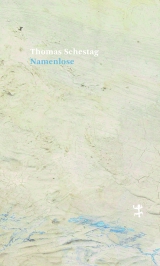Faculty Publications from Thomas Schestag and Kristina Mendicino
 |
Thomas Schestag, Namenlose (Berlin: Matthes & Seitz, 2020) This book in three parts follows traces of the Odyssey of names (in Homer, Dante, Hölderlin, Borges, and Charles Olson), proceeding from the very name Odysseus, and from Ulysses’ ruse offering to Polyphemus, whose sole eye he will burn out, when asked for his name, an echo of Odysseus: oûtis; literally meaning, when read apart (in Ancient Greek), oú tís, No One, Non-One, Nemo, Nobody …: as if offering (among other readings) the name of namelessness: Nameless as a name (No One as someone’s name). The book’s middle section takes another perspective: It approaches what may be called the architecture of names: discussing stairs and staircases in Franz Kafka’s (published and unpublished) prose, with reference to Kafka’s little story Die Sorge des Hausvaters which centers on a thing-like creature bearing the name Odradek that mostly appears on (and disappears from) stairs and staircases and that, when asked for where he lives, whispers the answer, as if without lungs: “Unbekannter Wohnsitz“ [Whereabouts unknown]. |
 |
Kristina Mendicino, Announcements: On Novelty (Albany, NY: SUNY Press, 2020) A study of novelty through analyses of the language of announcement in revolutionary texts. Mendicino argues that the notion of a novum cannot be understood without attentiveness to the language of announcement, not least of all because the "new" has always been associated with a particular mode of linguistic performance. Through close readings of emphatically annunciatory texts, she demonstrates how the extreme possibilities of expression that they present through specific citational and rhetorical praxes render the language of announcement overdetermined and anachronistic in ways that exceed any systematic account of historical time and experience. This excess in and through language is precisely what opens hitherto unheard of alternatives for conceiving of historical temporality and political possibility. |